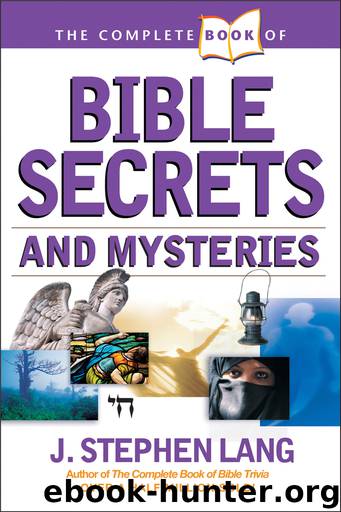The Complete Book of Bible Secrets and Mysteries by J. Stephen Lang

Author:J. Stephen Lang
Language: eng
Format: epub
Tags: RELIGION / Biblical Reference / General
Publisher: Tyndale House Publishers
Published: 2015-12-31T16:00:00+00:00
THE BIBLE IN WORSHIP (ANSWERS)
1. Psalms (118:24)
2. Isaiah (6:3). The words were said by the angels Isaiah saw in the Temple.
3. Lectionaries. They are used in Catholic, Orthodox, Episcopal, and other churches.
4. Romans (16:16), 1 Corinthians (16:20), 2 Corinthians (13:12), 1 Thessalonians (5:26). It apparently was common practice in New Testament times.
5. 1 Peter 5:14
6. Psalms (134:12); 1 Timothy 2 also mentions “lifting up holy hands.”
7. The angels who announced Jesus’ birth (Luke 2:14)
8. Matthew (28:19), Jesus’ “great commission,” in which he tells the disciples to baptize in the name of the Father, Son, and Spirit
9. John (13)
10. Matthew’s
11. None. So far as we know, infants were not baptized in the early church.
12. Acts (2:4; 19:6) and especially 1 Corinthians (12–14)
13. The Churches of Christ and some other noninstrumental churches
14. Paul, notably in 1 Timothy 2:12, which states that women are not to have authority over men
15. 1 Timothy and Titus
16. No one knows, since church buildings are not mentioned in the New Testament. In the early church, all churches were “house churches,” meeting in private homes.
17. Apparently at every worship service (1 Corinthians 11)
18. 1 Timothy, 2 Timothy, Titus
19. Probably 1 Corinthians, which addresses such issues as the Lord’s Supper, speaking in tongues, spiritual gifts, and order in worship
20. None are, which is why some denominations do not use instruments in worship
21. The book of Psalms
22. Not one. The New Testament gives the impression that Christians had been married either in a Jewish service or in a Roman civil ceremony.
23. Alleluia
24. Canticles. This word usually refers not to the Psalms but to other Bible passages that are poetic and are often sung or chanted.
25. The “praise churches,” that is, charismatic churches
26. “The Word of the Lord”
27. “Thanks be to God.”
28. Probably Episcopalian
29. The Psalms
30. The books of the Apocrypha, that is, the books between the Old and New Testaments. Most Protestant churches do not believe that the Apocrypha is inspired—at least, not in the same way as the Old and New Testaments are.
31. The visit of the wise men and also the baptism in the Jordan
32. 1 Corinthians 13: “Love is patient, love is kind.”
33. Matthew’s Gospel, in which Jesus commands the apostles to “go and make disciples” and baptize them with this formula (Matthew 28:19)
34. Job (19:25)
35. Revelation (19:1, 3, 4, 6). But in the original Hebrew Old Testament, the Hebrew words Hallelu jah occur many times—and in our English translations, it almost always appears as “Praise the Lord” (which is what it means, of course).
36. King Herod’s slaughter of the infant boys of Bethlehem when Jesus was born (Matthew 2:16)
37. The resurrection of Jesus, who was raised on the first day of the week
38. Jesus, of course, spoken before he raised Lazarus from the dead (John 11)
39. Old Testament, Gospel, Epistle. (Also, a Psalm is usually said—or sung—or chanted.)
40. It isn’t in the Bible.
41. None. The first generation of Christians did not have (or seem to want) special buildings in which to worship. They met in homes, or wherever they could gather a group of believers together.
Download
This site does not store any files on its server. We only index and link to content provided by other sites. Please contact the content providers to delete copyright contents if any and email us, we'll remove relevant links or contents immediately.
The Infinite Retina by Robert Scoble Irena Cronin(6241)
Harry Potter and the Cursed Child: The Journey by Harry Potter Theatrical Productions(4492)
The Sports Rules Book by Human Kinetics(4379)
Molly's Game: From Hollywood's Elite to Wall Street's Billionaire Boys Club, My High-Stakes Adventure in the World of Underground Poker by Molly Bloom(3529)
A Knight of the Seven Kingdoms by George R R Martin(3324)
How To by Randall Munroe(3105)
Quidditch Through the Ages by J.K. Rowling(3100)
Flowers For Algernon by Daniel Keyes(3099)
Quidditch Through the Ages by J K Rowling & Kennilworthy Whisp(2966)
Stacked Decks by The Rotenberg Collection(2880)
Quidditch Through the Ages by Kennilworthy Whisp by J.K. Rowling(2858)
Quidditch through the Ages by J. K. Rowling(2792)
776 Stupidest Things Ever Said by Ross Petras(2775)
Quidditch Through The Ages by J. K. Rowling(2761)
Ready Player One: A Novel by Ernest Cline(2717)
What If?: Serious Scientific Answers to Absurd Hypothetical Questions by Randall Munroe(2700)
Beautiful Oblivion by Jamie McGuire(2602)
The Book of Questions: Revised and Updated by Gregory Stock Ph.d(2562)
Champions of Illusion by Susana Martinez-Conde & Stephen Macknik(2444)
